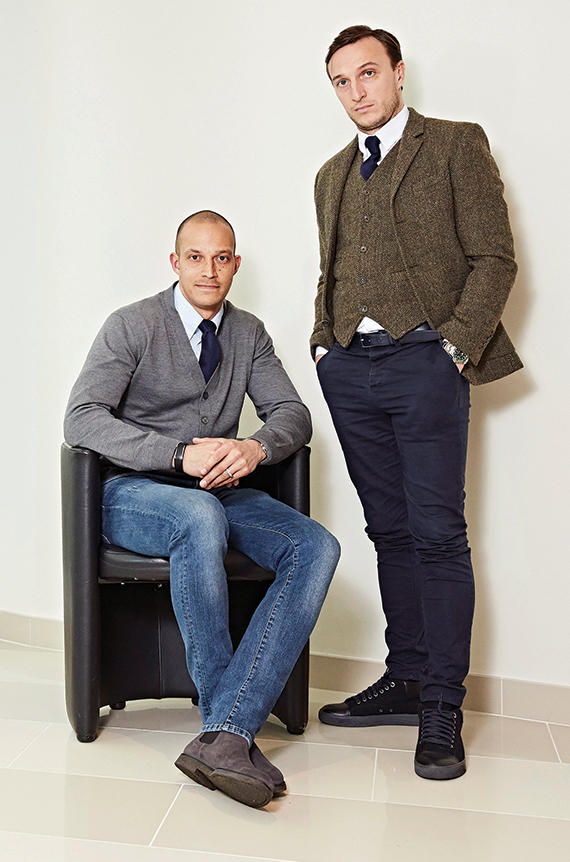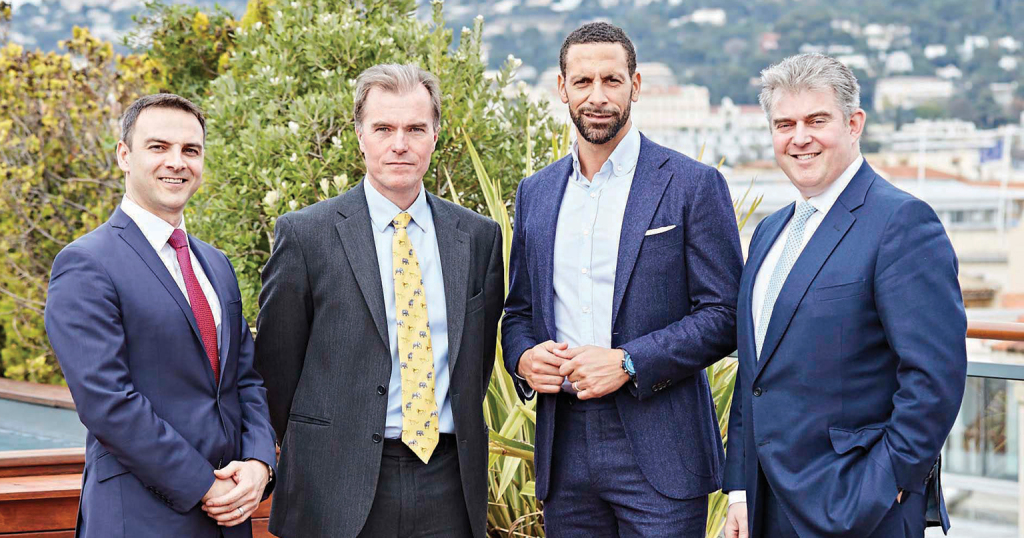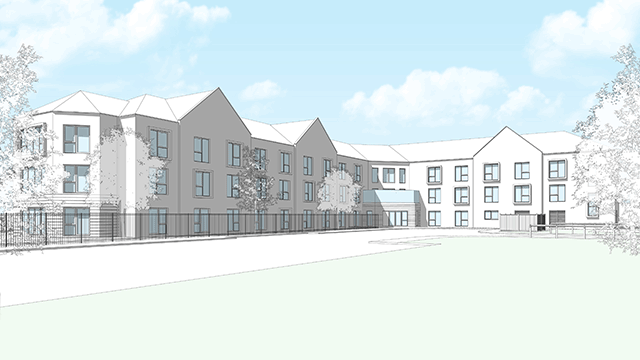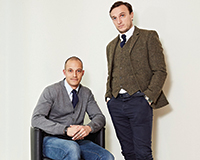‘No ball games’ said the signs on the estates where these Premiership footballers grew up. But with Aviva and Colliers onside, they want to turn that around by putting social housing and sport at the heart of communities. Damian Wild reports. Portrait by Tom Campbell
The irony of the launch venue for his UK-based Legacy project is not lost on Rio Ferdinand. “I’m happy we are here and doing it… in Cannes,” he deadpans. A sunny Thursday afternoon in a palatial apartment above La Croisette is an incongruous location for the launch of an ambitious social housing project back on this side of the Channel. But as MIPIM veterans know, there is no better place to grab attention.
And with Ferdinand (Champions League winner) and his Legacy supporters Mark Noble (captain of West Ham United) and Bobby Zamora (now at Brighton & Hove Albion, previously of Tottenham Hotspur) in town, attention is not in short supply.
Making a splash
The three were in Cannes to launch the first regeneration project from Legacy. Partnering with Central Bedfordshire Council, Aviva, McLaren and Colliers, they are fast-tracking a sport-led, mixed-use development in Houghton Regis. The local authority will supply a 22ha site in what is one of the most deprived areas of the UK, where 41% of children grow up in low-income households and unemployment is double the national level, as is the proportion of single parents.
With Aviva Investors putting up the money, the scheme will create up to 1,400 new homes – a mix of affordable, social rented and privately owned – as well as a sports academy and a possible base for the Rio Ferdinand Foundation. Focusing on family housing, work begins on site in the first quarter of 2017 with phase one due for delivery two years later.
And this is not a one-off. Talks to get to the point of launch have been going on for a year, and discussions with other local authorities are under way. The London borough of Newham is most advanced; Croydon is one of four a little further behind.
Giving something back

The goal is simple as, seemingly, is the model.
Legacy projects will deliver a minimum of 45% social and key worker housing. Local authorities will own the freehold of sites with private investors buying a long leasehold of typically 45 years.
“I am from a council estate and I have always had that feeling I want to give something back,” says Ferdinand, who is Legacy’s chairman. “You hear a lot of people say they want to give something back and they do an appearance and it gets lost. There’s not any real legacy behind it – there is no carry over and no carry on. I was lucky enough to bump into Richard Walsh from Colliers, and the model he thought would work fitted the model I saw.
“At the heart of that was the community. I have taken my kids back to the estate I grew up on and it is a ghost town. Just bricks. There is no passion, no kids around anymore, none of the emotion that was there on the estates I grew up on. And at the core of that was an area for children to play in with community leaders who were the inspiration to the kids.”
For Zamora and Noble, who both grew up on estates in Newham, the motivation is the same. “I moved seven times around Newham in four years when I was a kid,” says Noble. “No one can turn round and say to us ‘What do you know? You haven’t been through it’.”
It seems an unlikely team: a commercial agent and three gifted and gilded Premiership footballers. But each of the players talks with ease about land ownership, tenures and the need to secure control of the sites. And there is a rapport between the footballers and Walsh that reinforces their insistence that Legacy is the result of hundreds of meetings.
Walsh has worked with Aviva and others for the past 15 years, applying a funding model to the commercial market. Legacy will extend the model to residential.
“It’s all fully funded at the front end from UK pension funds. We draw down over the development period,” he says. “It is great to be building PRS, but it doesn’t really serve a purpose from a social and affordable perspective. It doesn’t house key workers and it only serves social tenants to a point, but you are talking about 10-15%. Our ideal model is 45-50% social housing. Our financial model generally sits at 50/50 which is what these guys were really keen to do. The important thing is dropping the Legacy Foundation in as well.”
The council estate where Ferdinand grew up is in Peckham, in the south London borough of Southwark, and he is determined to launch a Legacy project there one day. For Noble and Zamora getting a project off the ground in Newham would perhaps be most satisfying. Especially so for Noble, given West Ham’s move to the borough’s Olympic Stadium next season.

Community spirit
And while they can talk the real estate talk these days, the reason for getting involved is the rounded nature of the projects – from homes to jobs. “We want it to be a community, not an estate – PRS mixed with social tenants, people looking out for each other,” says Zamora. “We want to double the number of apprenticeships if we can – not just brickies, sparkies and plumbers. There are bright sparks in and around there that just haven’t been given the opportunity.”
Noble interrupts: “Marketing, QCs, architecture. It is about giving everyone a chance.”
If anything Walsh appears to be tempering their ambition. “We have got into the stage of designing with six local authorities,” he says. “One thing that we are guaranteeing them is that these guys will be part of it. The last thing we want to do is get 20 of these and these guys either don’t go at all or go very little. The whole aim is that we can do this properly and we can commit to it.”
From a funding perspective, the players are putting money into the foundation. But mostly they will be investing time. Ferdinand has finished his playing career, while Zamora is undecided about whether to continue past this season. Noble hopes he has another five or six years left in him yet, but recognises the scale of the Legacy commitment. “If it goes the way we hope it goes and we can help a lot of people, it is going to be a lot of work.”
And he already has the measure of the property business. “After a year of being together,” he says, “we know these things don’t happen overnight.”











